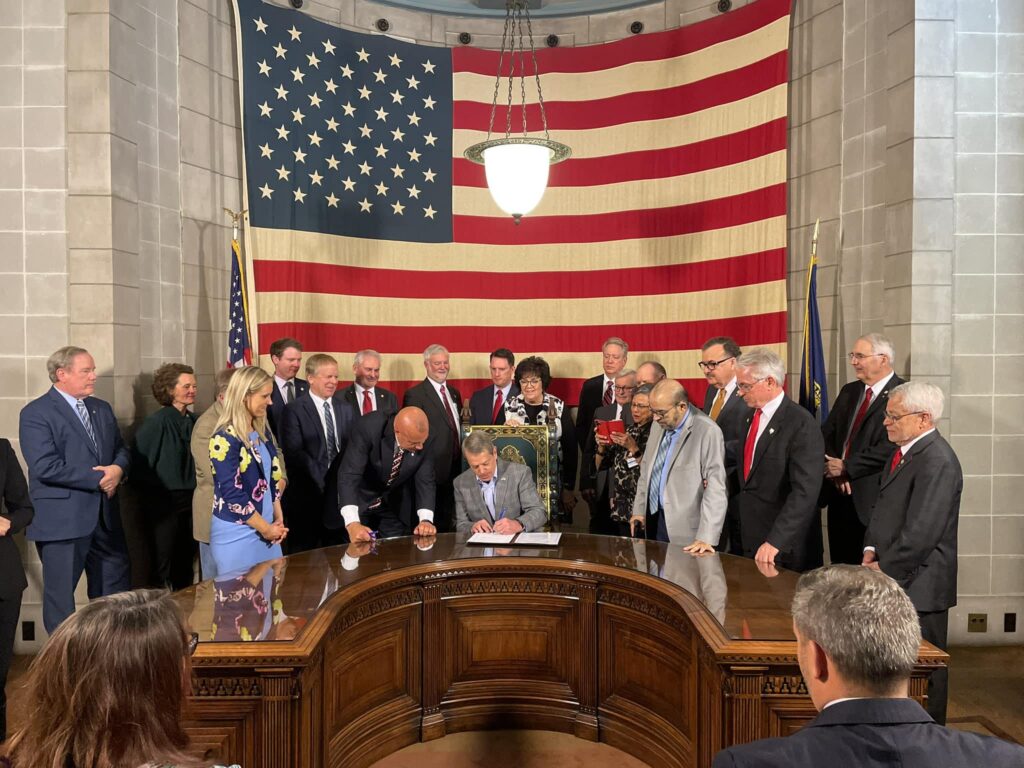Nebraska enacts bill protecting minors from gender transitions, unborn after 12 weeks
(The Daily Signal) – Nebraska Gov. Jim Pillen, a Republican, signed a combination bill Monday protecting minors from gender transitions and protecting unborn babies after 12…

(The Daily Signal) – Nebraska Gov. Jim Pillen, a Republican, signed a combination bill Monday protecting minors from gender transitions and protecting unborn babies after 12 weeks’ gestation.
The measure provoked several extremely pro-trans Democratic senators to engage in an unprecedented filibuster of the entire legislative session and barrage the bill with unserious procedural motions designed to bog the process down.
“Protecting our children is critically important,” state Sen. Kathleen Kauth, a Republican, said at the bill signing. “I brought LB 574 because we have too many kids who are being swept up in what is a social contagion, and being told that … if they just switch their gender, they’ll be fine, everything will be great. That’s not true.”
With 10 days left in the legislative session, Nebraska’s unicameral legislature voted 33-15 on Friday to pass the bill, LB 574, through four separate votes, with the exact margin of support needed to break the filibuster.
In an increasingly common sight, protesters in the balcony interrupted the legislative session, forcing it to recess while the balconies were cleared. At around 2:50 p.m., while Kauth, the bill sponsor, discussed the lack of scientific evidence that gender transition procedures are safe for children, a protester clad in a shirt depicting a combat knife and the slogan “protect trans kids” began yelling obscenities.
Other protesters began chanting and throwing dirty tampons on to the senators below. Four people (three protesters and a supporter) were arrested for refusing to leave as police cleared the balconies. In anticipation of protests, the Legislature had taken the precaution of assigning separate balconies for opponents and supporters of LB 574.
Disruptive balcony protests against legislation to protect children from gender transition procedures have led to arrests in Kentucky (March 29), Florida (April 18), Montana (April 24), and now Nebraska.
Protesters also occupied the rotunda of the Nebraska Capitol, chanting so loudly (and singing multiple verses of “Amazing Grace”) that senators had trouble hearing questions addressed to them. Two more protesters in the rotunda were arrested after a man attempted to prevent a sergeant-at-arms from opening the chamber door and a woman punched an officer in the chest.
“‘Trans people belong here. We need trans people. We love trans people.’ That’s what they’re saying out there. They’re standing in a circle in a rotunda saying that over and over again,” said state Sen. Machaela Cavanaugh, a Democrat who filibustered the entire session over LB 574, in an eerie, emotionless tone.
Cavanaugh then repeated the chant, slowly at first, but gradually building in fervor and expression, until by the 28th time she had reached an emotional crescendo between a scream and a wail. Her next remarks indicated the performance was not for the benefit of her fellow senators, but for the protesters outside.
“You matter. You matter,” Cavanaugh said. “And I am fighting for you. I will not stop. I will not stop today. I will not stop tomorrow. You are loved. You matter. You belong here.”
Due to protesters obstructing entrances in the rotunda, law enforcement officers escorted senators out of the chamber through a construction zone. The move prompted Cavanaugh to quip: “If you have to lie, cheat, [and] steal to get your outcome, you should really ask yourselves, should you be doing this? And if you have to exit through a construction zone, should you have voted that way?”
“Don’t you dare get up here and spout about cowardice when senators chose not to incite a mob of hundreds of angry protesters that not only were packing the rotunda but were blocking every single entrance out of this building,” state Sen. Julie Slama, a Republican, responded to Cavanaugh.
Slama previously filed a motion to censure Cavanaugh for comparing the bill to genocide.
“Don’t you dare spout about cowardice when we had senators leaking where senators were evacuating to, so that the angry mob could go catch them there,” Slama said.
Video footage shows Cavanaugh entering the rotunda to cheers.
The bill likely will face a legal challenge.
“There are lawsuits ready to be filed, in the event that this gets signed into law,” warned state Sen. Jen Day, a Democrat, before it passed.
Out Nebraska’s executive director, Abbi Swatsworth, added that the bill’s passage was “very painful news, but we’re not done yet.”
Pillen responded to the prospect of lawsuits against the bill, saying: “Of course we’re prepared, and of course we’re going to win if that takes place.”
However, some opponents’ remarks implied that their continued operations against the bill would stretch beyond lawsuits.
“We’re going to take this as far as need be, to make it stop,” said Dr. Alex Dworak, associate medical director at One World Omaha, whose practice would be affected by the bill’s restrictions on gender transition procedures for minors.
Incendiary remarks also came from members of the Nebraska Senate.
“I can’t imagine [how] anyone ran to be in the Legislature, and they’re motivated by hate. I don’t know how to calm us down,” said state Sen. Lou Ann Linehan, a Democrat.
“Do anything. Do everything,” Cavanaugh urged protesters, although after criticism from other senators she added: “I do not mean political violence. Anything within legal reason.”
State Sen. Megan Hunt, a Democrat who is another of LB 574’s fiercest opponents and says she has a daughter who identifies as transgender, warned fellow senators to vote against the bill, saying: “I’m asking you to love your family more than you hate mine.”
“Elections matter. Conservative leadership matters. [I] couldn’t be more proud of the work that everybody’s done to stand up, for the courage to fight for our kids, to save babies,” Pillen said,
The governor added:
Today is an extraordinary, historic day for the state of Nebraska. It’s a day where it’s really simple. We’re standing up to protect our kids so that our state has a bigger and brighter future. LB 574 is the most significant win for the social conservative agenda in over a generation in the state of Nebraska. …
This bill is just a start. We have a lot more work to do. We are working to inspire Nebraskans to get in the game so that abortion is simply unthinkable. … Our kids deserve protection, whether they be an unborn boy or girl, or a teenager trying to figure out who they are.
LB 574 faced a marathon process to become law. As soon as it was introduced, it faced opposition from far-left Democrats such as Hunt and Cavanaugh who harassed it with constant motions. Once the bill cleared the committee process, Cavanaugh declared that she would filibuster the entire legislative session unless the speaker agreed to kill the bill, which he declined to do.
Since that time, the Legislature had advanced bill only slowly.
Under the rules of the Nebraska Senate, each bill must come up for three rounds of debate before passage, with set time periods before lawmakers can invoke cloture and advance the bill. Even after the required time period elapses, a cloture vote requires a two-thirds majority (33 of 49 votes, or 66%) to succeed.
Currently, Republicans hold 32 seats in the Nebraska Senate (which is technically nonpartisan), one vote short of the margin needed to invoke cloture. However, state Sen. Mike McDonnell, a Democrat, is openly pro-life because of his Catholic beliefs and, it turns out, solidly against gender transitions for minors, too.
McDonnell’s vote, plus that of every Republican, is essential at every stage to advance any bills that advance policies that are pro-life or pro-biblical sexuality.
One casualty of this high threshold to break a filibuster was Nebraska’s heartbeat bill (LB 626). After supporting it through the first round of debate, state Sen. Merv Riepe, a Republican, voted “present” during the second round of debate, causing the bill to fall short of the 33 votes needed to advance.
Although Riepe no longer would support restricting abortion after six weeks, he ultimately would support restricting abortion after 12 weeks in voting for LB 574.
“I believe most Nebraskans feel 12 weeks with reasonable exceptions is a reasonable and sensible compromise that protects the unborn, respects women’s reproductive rights, and is legally defensible,” he said.
LB 574 nearly suffered the same fate.
McDonnell supported the bill wholeheartedly although a Democrat, but several Republican senators had reservations about the bill as originally introduced, particularly with its prohibition against doctors prescribing puberty blockers.
Although puberty blockers “stop” fertility, cause serious side effects, are not tested or approved for blocking normal puberty, and virtually guarantee children will continue on to more aggressive gender transition procedures, the pro-trans medical community touts them as harmless and reversible.
These Republicans agreed to support the bill through two rounds of voting, but only on the condition that it would be amended to address their concerns. Kauth introduced an amendment to weaken the bill so that it would prohibit gender transition surgeries only on minors, but it overwhelmingly failed, with the bill’s opponents helping to sink it.
After a month of further negotiations, when the bill came up for a vote after the third round of debate, Republicans adopted a compromise amendment, which also included restrictions on abortion after 12 weeks (another compromise position among Republicans) and was the version that finally passed.
In its final form, LB 574 prohibits gender transition surgeries on minors and the use of state funds for gender transition procedures on minors. It also subjects puberty blockers and cross-sex hormones to rules and regulations promulgated by the chief medical officer, which must include a “minimum number of gender-identity-focused therapeutic hours required prior to an individual” receiving drugs, “patient advisory requirements,” “patient medical record documentation,” and a “minimum waiting period.”
Nebraska’s chief medical officer is a position appointed by the governor.
The bill excepts hormone treatments “begun before” its passage or if the individual “has a long-lasting and intense pattern of gender nonconformity or gender dysphoria which began or worsened at the start of puberty.”
It also protects the life of unborn babies after 12 weeks’ gestation with exceptions for rape, incest, and the life of the mother; previously, Nebraska law protected life only after 22 weeks’ gestation.
Nate Grasz, policy director for Nebraska Family Alliance, called the bill “a victory for truth, common sense, and the protection of vulnerable children and a strike against the extreme obstruction tactics of opposing senators.”
Grasz told The Washington Stand that the new law “would keep Nebraska from becoming a destination for abortion and ensure children receive real help instead of surgeries with lifelong, irreversible consequences.”
However, Grasz said he recognized the bill was not perfect.
“It’s not everything we hoped to see accomplished this session, and we’re going to keep fighting until every life is protected,” he said. “We want Nebraska to continue to lead on these issues, rather than fall behind.”
Republican lawmakers in North Carolina accomplished a similar feat last Tuesday, successfully overriding a veto by Gov. Roy Cooper, a Democrat, of a compromise bill to restrict abortion after 12 weeks. That override also was without a single vote to spare.
In Nebraska, Kauth sounded a similar note.
“It’s not exactly what we wanted,” she said. “But, as I’ve been finding out, you don’t get exactly what you want.”
However, Kauth said, the unprecedented filibuster actually helped LB 574 finally succeed.
“Had they not filibustered, this bill would have been dead in February,” she said. “Because the filibuster gave us more time to talk to each other, … the filibuster is actually what made this happen. And so, I doubt it was their intention, but that gave us the time to make this work. And now we will be able to let children grow.”



